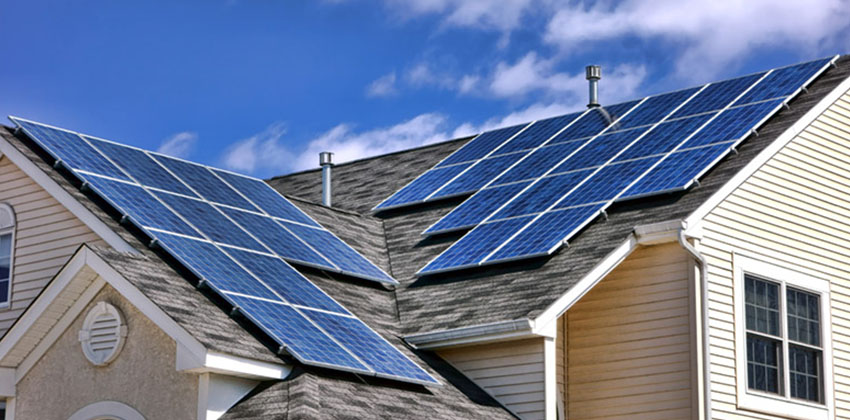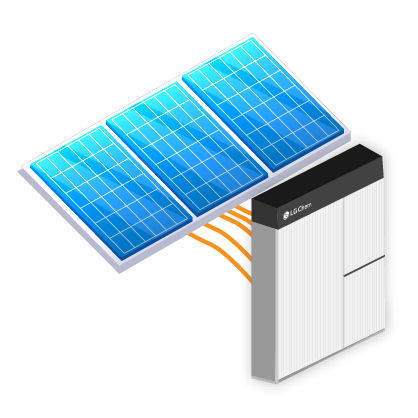See how much solar panels cost in your area

Please enter a valid zip code.
Zero Upfront Cost
Best Price Guaranteed
![]()
![]()
Solar Learning Center > Solar Panels for Home > Solar Panel Efficiency - Pick the Most Efficient Solar Panels > Page 6
Solar Panel Efficiency - Pick the Most Efficient Solar Panels

You may hear the term “efficiency” thrown around a lot when reading up on solar panels. It sure sounds like a good thing, but what exactly is solar panel efficiency? How is it measured?
We’ll go over some of the major factors contributing to the efficiency of solar modules, the impact of environmental factors, and the efficiency gap between monocrystalline and polycrystalline modules.
Ready to design your custom solar system? Connect with an Energy Advisor to get started.
What is solar panel efficiency?
Solar panel efficiency is a measurement of how much of the sun’s energy a certain panel can convert into usable electricity. This is done by capturing the electrical current generated when sunshine interacts with silicon or thin film cells inside a solar panel.
These solar cells are tightly packed alongside each other inside glass rectangles designed to attract sunlight. Then the sunlight is converted into an electrical current, sent to your circuit breaker box, and distributed throughout the house.
It’s measured fairly simply. If a solar panel has 20 percent efficiency, that means it’s capable of converting 20 percent of the sunshine hitting it into electricity. The highest efficiency of solar panels can reach almost 23 percent efficiency, which is impressive considering the first solar modules were only 6% efficient.
Fun fact: Researchers at the National Renewable Energy Lab (NREL) created a solar cell that’s 39.5% efficient, breaking the record of 39.2% set in 2020… by NREL scientists.
What are the most efficient residential solar panels in 2024?
Residential solar panels range from 13 to 22.8% efficiency, with most panels hovering around the 20% mark.
There are advantages to having high-efficiency solar panels, especially if you have limited roof space or shading that inhibits your energy production. High-efficiency panels can increase your power output per panel, allowing you to create more energy with less space and sunlight.
Here are the most efficient solar panels available on the solar.com marketplace.
High-efficiency solar panels by manufacturer and model:
| MANUFACTURER | MODEL | Max EFFICIENCY RATING |
| SunPower | A-series | 22.8% |
| SunPower | X-series | 22.7% |
| Panasonic | EverVolt® Photovoltaic series | 22.2% |
| SunPower | M-series | 22% |
| REC | Alpha series | 21.9% |
| Silfab | Elite series | 21.4% |
| SEG | SIV AC Module Series | 21.25% |
| Silfab | X series | 21.1% |
| Solar World | Sunmodule series | 21.1% |
| S-Energy | SL40-60MCI-370 | 21.04% |
Related reading: How To Find the Best Solar Panels for Your Home in 2024
Factors that affect solar panel efficiency
There are several factors that can make a solar module more or less efficient.
The type of panel
There are two basic types of solar panels on the market: Monocrystalline and polycrystalline.
Monocrystalline solar cells are cut from a single source of silicon. This makes them more pure and, as a result, more efficient and more expensive. Monocrystalline panels range between 15 and 22.8% efficient and make up most of the high-efficiency solar panels on the list above.
Polycrystalline solar cells are made with silicon blended together from multiple sources, giving them their signature blue color. This leads to imperfections on the surface of the panel that limit efficiency to around 13-16%. However, polycrystalline panels are less wasteful and less expensive.
Learn more about mono vs poly solar panels here.
Environmental Factors Affecting Solar Cell Efficiency
Shade from nearby buildings, trees, or heavy cloud coverage are the nemeses of efficiency. After all, how can your expertly engineered solar panels produce electricity without sunlight? Though, some light does make it through the clouds.
Significant amounts of dirt and dust can also reduce efficiency. For the most part, solar modules are self-cleaning. A rain shower can reset your panel efficiency in just a few minutes. If you live in a particularly arid region and heavy dust storms are a problem, you might want to clean the panels off yourself. Here’s how to know if your panels need cleaning and how to go about it.
A common misconception is that winter weather will mean lower efficiency. The opposite is often true. Though solar modules are designed to withstand average temperatures, they’re more inclined to function better when they’re cooler. This is true with most electronic equipment. And since solar panels need light (not heat) from the sun, bright winter days might be some of the most productive.
Snow is another area of confusion with solar panel efficiency. A thin layer of snow won’t hinder solar efficiency much. Read more about snow with solar, and solutions for heavy snowfall with solar here.
Internal factors
Many internal and scientific factors play in the solar cell efficiency equation. But two major components are:
- Reflectance efficiency
- Thermodynamic efficiency
Reflectance efficiency is determined by how much sunlight is reflected back instead of absorbed and put to use. The less reflection in solar cells, the better. Silicon reflectance can be as much as 38 percent, though most solar cells have a slight micro-pyramid shape. This reduces reflectance to about 11 percent.
There are ways to reduce reflectance, such as anti-reflective coatings. Really advanced solar cell construction or, “stacking micro- and nano-sized arrays on top of the larger structures” can bring reflectance down to just 1 or 2 percent.
Thermodynamic efficiency is the maximum efficiency possible. It’s the height at which the sun’s energy can be converted into electricity. This number is right around 86 percent, the thermodynamic efficiency limit.
The way photons interact with solar cells, they can only generate electricity from the sun’s energy up to a certain point. After that point (86 percent) thermal energy, or heat, is created.
One way to improve thermodynamic efficiency is to construct multi-junction or tandem solar cells. This improves efficiency by dividing the solar spectrum into smaller areas, which raises the efficiency limit for each section.
Does solar panel efficiency matter?
High-efficiency solar panels are very useful for homeowners with limited roof space or shading. And a percent or two more efficiency is nice.
However, with electricity rates rising rapidly in 2022, the most important factor for a solar system is time. The sooner you go solar, the sooner you can freeze your electricity costs and start saving!
Solar panel efficiency FAQ’s
How efficient are solar panels?
Residential solar panels range from 13% to 22.8% efficient, with most modern models hovering around the 20% mark. This represents remarkable growth from the 6% efficiency of the early solar panels constructed in 1950’s.
What are the most efficient solar panels?
The most efficient residential solar panels are nearly 23% efficient and include the following models:
-SunPower A-series (Up to 22.8%)
-SunPower X-series (Up to 22.7%)
-Panasonic EverVolt® Photovoltaic series (Up to 22.2%)
-SunPower M-series (Up to 22%)
In 2022, researchers at the National Renewable Energy Lab (NREL) created a solar cell with a record 39.5% efficiency, breaking their previous record of 39.2% in 2020. However, these expiremental solar cells have a long way to go before they can be scaled for market applications.
Do solar panels lose efficiency over time?
Solar panel efficiency declines over time through a process called degradation. This is a natural process due to prolonged exposure to sun, heat, ice, wind and other elements.
Related Articles
What Are Solar Panels Made Of?
You might know what solar panels can do – convert sunlight into energy, save money, create energy independence, increase your home’s resale value – but...
Go Solar Now or Wait for Better Tech?
“Shouldn’t I wait to go solar until the costs are lower and the technology is better?” We get this question a lot at Solar.com – and...
REC Solar Panels: The Complete Review
Founded in Norway in 1996, REC Group is the leading European brand for Solar panels and has been providing sustainable and high-performance products, services, and, investments...
Mission Solar Energy: The Complete Review
Mission Solar Energy, a U.S. Photovoltaic (PV) solar module company based in San Antonio, designs, engineers and assembles high-quality solar modules that are well suited...
Hyundai Solar: The Complete Review
Hyundai Solar began in 2005 by Hyundai Heavy Industries (HHI), a popular player in the heavy industries sector, with production centers in Eumseong, Korea. As...
The 3 Most Efficient Solar Panels for Your Home
Modules have come a long way since the 1960s when the first solar panels maxed out at 14% efficiency. While higher efficiencies sound better, what...
JA Solar: The Comprehensive Review
Founded in May 2005 and later listed on the New York Stock Exchange in 2007, JA Solar is a globally recognized manufacturer of solar...
Canadian Solar: The Comprehensive Review
While there are numerous solar panel companies on the market, Canadian Solar is definitely a top player in the industry. Beyond manufacturing quality panels, Canadian...
JinkoSolar: The Comprehensive Review
JinkoSolar is a manufacturer and global supplier of solar modules. They are headquartered out of Shanghai, China and employ over 12,000 across their 8 production...
How Do Wind and Humidity Affect Solar Panel Efficiency?
Several factors play into solar panel efficiency. The type of solar cells and how the panels are constructed are the most important factors in how...
Perovskite and Silicon Solar Cell Efficiency Reaches 25.2%
While around 90% of solar panels currently on the market are made out of silicon, adding a new material may soon make existing module design...
4 Factors That Can Affect Solar Panel Production
Not all solar panels are created equal. Power ratings, efficiency ratings, and degradation rates are just a few of the qualifications that set solar panels...
Production vs. Performance Guarantees
Uncertainties are given when making a big ticket purchase that lasts 30 plus years. Whether that is a home, a vehicle, or financial investments. How...
See how much solar panels cost in your area.

Please enter a valid zip code.

Please enter a valid zip code.
Zero Upfront Cost. Best Price Guaranteed.









